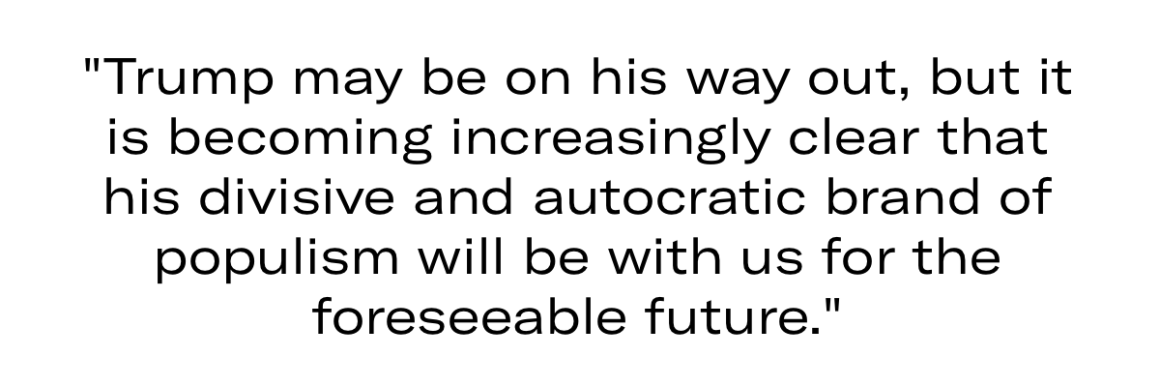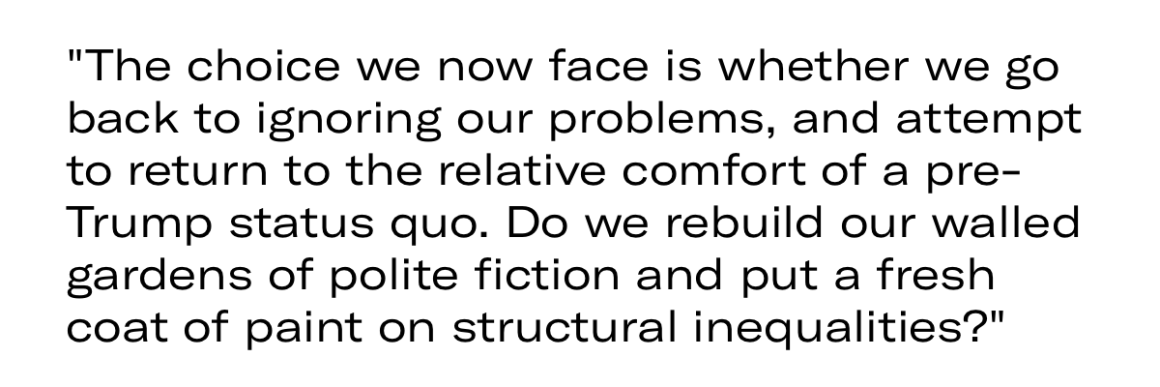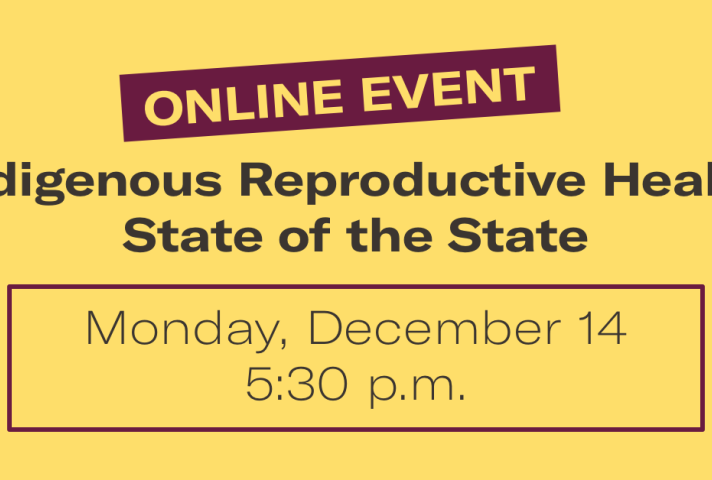It’s the end of an era; four of the darkest years in recent memory are drawing to a close. In a matter of weeks, President Donald Trump will leave the White House (kicking and screaming and tweeting), and former Vice President Joe Biden will replace him. While the ACLU is not a partisan organization and we do not endorse any candidates for office, it would be disingenuous to pretend that this was not the outcome we were hoping for. Like many of you, I feel a mix of emotions at this moment. I share in the elation that overflowed into the streets when Trump’s loss became official. I feel relief that our country will not suffer another four years of Trump’s racist, xenophobic, mysogynistic, and hateful leadership. And I feel great pride in the work that the ACLU of New Mexico and the ACLU at large across this nation—has done to protect the basic rights, dignity, and humanity of all people during these past four years.
Four years ago, in the wake of Trump’s surprise election I sat down to write a letter to the ACLU of New Mexico membership in this publication and made you this promise:
“We will join the front lines to defend immigrants, Muslims, and people of color from the racist policies that are sure to storm our communities in the coming years.
We will stand with women who fight for control of their own bodies.
We will challenge any attempt to restrict voting rights and undermine our democracy.
We will continue to fight for a criminal justice system that is fair, impartial and offers a true chance of redemption.
We will redouble our efforts in Congress, the legislature, the courts, the media and in our communities.
We will fight to protect all of the hard won gains we have achieved. We are not turning back.
This is our America, not just Trump’s. And we will fight for it every step of the way.”
We knew then how hard the fight to come would be. But we never could have imagined the groundswell of support we would have from members like you to help us keep our promise. In the months between Trump’s election and his inauguration, our membership more than quadrupled nationwide and tripled here in New Mexico. Moments after Trump announced his Muslim ban in January 2017, ACLU attorneys began meeting with Muslim travellers stranded in airports across the country and thousands of Americans marched on airports in solidarity and protest. As you marched in the streets, we fought against the Trump administration’s bigotry and xenophobia here in New Mexico by working in the courts to win the release of migrants and refugees detained in facilities throughout the state. We went to bat for immigrant communities, pressuring state leadership to prevent local resources from being employed in Trump’s mass deportation schemes, joined a nationwide lawsuit to protect Iraqi immigrants from unjust deportation, and sued Immigration and Customs Enforcement (ICE) to prevent predatory immigration arrests on courthouse grounds.
We knew then how hard the fight to come would be. But we never could have imagined the groundswell of support we would have from members like you to help us keep our promise.
The day after Trump took office, millions of women took to the streets across the nation, including here in New Mexico, to demand reproductive freedom and other basic human rights routinely denied to women here in the United States. In the ensuing four years, the ACLU has been instrumental in beating back dozens of attempts to shutter abortion clinics and restrict access to basic women’s healthcare. In successive legislative sessions here in New Mexico, we helped pass a law expanding access to contraception by requiring insurance companies to cover a full range of options for men and women, and helped pass the Pregnant Worker Accommodation Act, which amends the New Mexico Human Rights Act to provide increased protections and reasonable accomodations for pregnant and parenting people in the workplace. During Trump’s tenure, we also sued Walgreens after they failed to prevent their pharmacists from denying women prescriptions critical to their reproductive health.
Over the past four years, we have doubled down on our commitment to racial justice and reform
of the criminal legal system here in New Mexico. We’ve filed record numbers of racial discrimination lawsuits, hired an attorney dedicated to indigenous justice issues, built a community centered movement to fight mass incarceration, and helped pass an unprecedented number of criminal justice reform bills, inclulding a comprehensive criminal justice reform bill focusing on accountability and treatment to both prevent crime and successfully reintegrate people back into society; and bills that banned the use of solitary confinment on vulner-able populations, allowed for criminal record expungement, decriminalized marijuana, removed barriers to employment for the formerly incarcerated, outlawed warrantless digital searches by law enforcement, and required universal adoption of body worn cameras by state and local law enforcement agencies.
I think we owe ourselves a moment to appreciate just how much we’ve accomplished together, even in the face of one of the most trying periods of the modern era. Our ferocious defense against Trump’s bigoted agenda and the great strides forward we’ve made here in New Mexico would have never been possible without the energy, resolve, and support of people like you.
I think we owe ourselves a moment to appreciate just how much we’ve accomplished together, even in the face of one of the most trying periods of the modern era.
This is, however, also a moment for sober contemplation of what is to come. Trump may be on his way out, but it is becoming increasingly clear that his divisive and autocratic brand of populism will be with us for the foreseeable future. This presidential election was not the repudiation of Trumpism that many of us were hoping for, and it seems likely that it is only a matter of time before a new leader, perhaps one more competent and calculating, assumes the Trumpist mantle and taps into the deep pool of rage, cynicism, and resentment that fueled Trump’s rise. Make no mistake, this fight is far from over.
Although Biden will no doubt be a better president than Trump in every conceivable way, we can’t count on him to be our savior. Exhausted as we are from fighting tooth and nail to protect our rights, our democracy, and our fellow Americans from the Trump administration’s relentless assaults—now is not the time to hang up our hats and put up our feet. A Biden presidency will only be as good as we push it to be. Remember: during the Obama years, we had no shortage of fights on our hands. Under his administration our battles included equality for LGBTQ+ people, historic cases protecting abortion access, police violence against Black people, massive expansions of the surveillance state, extrajudicial killings of American citizens, brutal suppression of Native water protectors at Standing Rock, mass deportations, and family detention of migrants and refugees.
We will hold a Biden administration accountable just like we have held accountable every other presidential administration going back 100 years.

If there has been one benefit to four years of Trumpist rule, it’s that it has made the injustice and inequality that plagues our nation impossible to ignore.
We will certainly have our work cut out for us here in New Mexico moving forward. Trump’s most enduring legacy is likely to be the packing of federal courts with right wing idealogues, including the U.S. Supreme Court which now has a 6-3 conservative supermajority hostile to abortion rights. We face the likelihood moving forward that the protections afforded to us by Roe v. Wade for the last half century will be steadily chipped away. This creates an urgent situation here in New Mexico. Although our state overwhelmingly supports a woman’s ability to make their own reproductive health decisions, an old law from the 1960s criminalizingdoctors who provide abortions is still on the books, though currently unenforceable. With Roe in such a precarious place, it becomes all the more urgent to get rid of this outdated and discriminatory law. In the upcoming legislative session, the ACLU of New Mexico will work tirelessly with its allies in the reproductive justice and health communities to strike this antiquated law from our books and ensure continued access to abortion in our state no matter what.
Although we have made impressive strides towards reforming our state’s criminal legal system, more work lies ahead of us than behind us. The coronavirus pandemic has shined a spotlight on how broken and inhumane our corrections system is, with people confined in unsafe and unsanitary conditions, most of whom are there because we have invested all our resources in criminalizing poverty, addiction, and mental illness rather than addressing the underlying societal causes of crime. We’ve filed class action litigation against the state to slow the spread of COVID in our communities by securing the release of people who pose no danger to society, and will continue to push at a policy level for more community-based alternatives to incarceration that are more effective, cost-efficient, and humane.
Although we have made impressive strides towards reforming our state’s criminal legal system, more work lies ahead of us than behind us.
As a border affiliate, immigration and border rights will continue to be a top priority for the ACLU of New Mexico. Regardless of who holds the presidency, we are still home to several federal immigration detention facilities run by for-profit prison corporations notorious for abuse and medical neglect. Coronavirus continues to spread like wildfire within these facilities, and detainees face threats of retaliation if they protest the conditions of their con-finement. Migrants, many of whom are fleeing torture or threats of death in their home countries, remain de-tained indefinitely —sometimes for months or years at a time—without access to legal help or fair hearings. Although we do not expect to see the kinds of massive immigration sweeps, family detentions, or deliberatecruelties of the Trump administration moving forward, history has shown us that injustice and abuse in the immigration and border enforcement systems will continue absent major structural and policy reforms. We will continue to fight for the rights, dignity, and freedom of people trapped in this inherently inhumane system for as long as we must.
If there has been one benefit to four years of Trumpist rule, it’s that it has made the injustice and inequality that plagues our nation impossible to ignore. For many of us who occupy privileged and sheltered positions in this country, the Trump presidency stripped away the polite fictions and pretty veneers that papered over deep and abiding systems of injustice. After Charlottesville, we cannot pretend that White supremacy is only part of our history and not our present. After George Floyd, we cannot ignore the systemic racism and brutality endemic in our criminal legal system. We cannot unhear the cries of children as ICE agents rip them from the arms of their parents.

The choice we now face is whether we go back to ignoring our problems, and attempt to return to the relative comfort of a pre-Trump status quo. Do we rebuild our walled gardens of polite fiction and put a fresh coat of paint on structural inequalities? Or will we use the momentum, solidarity, and resolve we have built over the past four years to tear down systems of oppression and rebuild our nation on true foundations of liberty, justice, and equality?
I know what path we at the ACLU of New Mexico will choose.
Date
Monday, December 28, 2020 - 11:00amFeatured image




